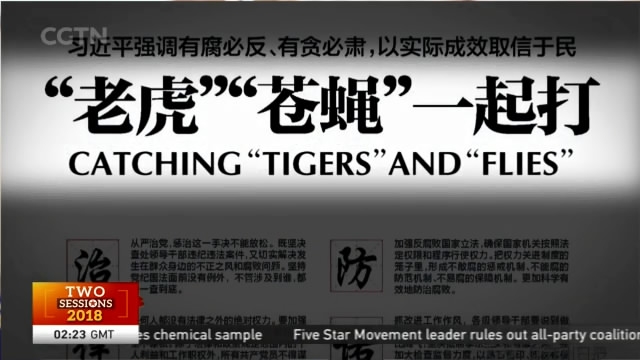
10:47, 14-Mar-2018
China's Political Season: Draft supervision law submitted to legislature

The National People's Congress has begun its fourth plenary meeting of the year. Lawmakers heard a draft supervision law that aims to help the nation's fight against corruption. Han Peng has more.
China's draft supervision law was submitted for its third reading at the national legislature. Li Jianguo, vice chairman of the Standing Committee of the 12th National People's Congress, talked about the bill to the 13th NPC, saying the new law is expected to serve as the fundamental and guiding document against corruption.
The bill calls for the establishment of new supervisory commissions at the national, provincial, city, and county levels.
LI JIANGUO, VICE CHAIRMAN STANDING COMMITTEE OF 12TH NPC "The purpose of reforms to the supervisory system is to integrate anti-corruption resources, unify the Party's leadership of anti-corruption efforts, and build a centralized and effective supervisory system with Chinese characteristics. The reform seeks the supervision of all officials exercising public power. Deepening reforms in the supervisory system mean innovation of organization and systems. It must break the institutional obstacles and establish a new national supervisory system."
HAN PENG BEIJING "The Supervisory Commission is more independent from the State Council, which puts it in a better position to scrutinize all Chinese officials."
The commissions will oversee state departments and agencies, investigate corruption cases such as bribery, embezzlement, and abuses of power, impose administrative penalties on erring officials, and hand over criminal cases to prosecutors.
LIU SHOUMIN NPC DEPUTY "Our anti-corruption campaign used to be focused on dealing with individual cases of corruption. But now, the commission will make anti-corruption a routine part of the Chinese government's work. This means the campaign has been institutionalized."
The draft makes clear regulations on China's new detention system, which will replace "shuang gui," an intra-party disciplinary practice. "Shuang gui" is exercised by Party disciplinary officials, where a Party member under investigation must cooperate with questioning at a set time and place. The new detention system will safeguard the rights of those under investigation with several measures.
If passed, it will make way for a centralized, unified, authoritative and efficient supervisory network under the Party's leadership. Han Peng, CGTN, Beijing.

SITEMAP
Copyright © 2018 CGTN. Beijing ICP prepared NO.16065310-3
Copyright © 2018 CGTN. Beijing ICP prepared NO.16065310-3